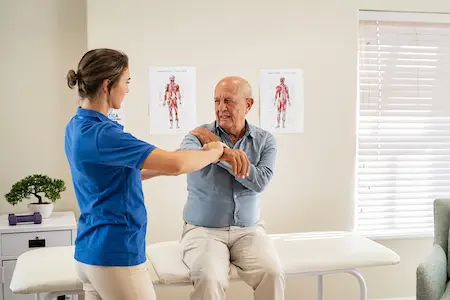As a physical therapist, you have worked hard to complete your education and earn your license. Now a complaint against you is threatening your career. You have too much at stake to try and handle a complaint and potential disciplinary action on your own. Instead, call an experienced physical therapist license defense lawyer to assist you in protecting your rights and your reputation.
Grounds for Discipline Against Physical Therapists
The Executive Council of Physical Therapy and Occupational Therapy Examiners is the state agency that regulates physical and occupational therapists. It serves as the umbrella agency for the Texas Board of Physical Therapy Examiners and the Texas Board of Occupational Therapy Examiners.
Under §343.2 of the Texas Board of Physical Therapy Examiners Rules, the Board has the authority to discipline individuals who hold physical therapy licenses. This disciplinary authority includes the ability to reprimand license holders, suspend or revoke licenses, or place on probation license holders whose licenses have been suspended.
Some of the grounds for disciplinary action against physical therapists authorized by the Board Rules include:
- Intemperately using drugs or alcohol
- Obtaining or attempting to obtain a license by fraud, falsification, or deception
- Having a license to practice another health care profession revoked or suspended
- Cheating on the national examination
- Committing gross negligence in providing physical therapy that the therapist knew or should have known would result in severe physical injury or death of a patient
- Being adjudged mentally incompetent or having a history of voluntary or involuntary psychiatric hospitalization
- Being convicted of any felony or misdemeanor offense that directly relates to the practice of physical therapy, including
- Any felony involving fraud, dishonesty, or deceit
- Any criminal violation of the Physical Therapy Act or other statutes pertaining to physical therapy or the medical profession
- Any crime involving moral turpitude
- Various other crimes involving violence, bodily harm to others, child abuse, injury to elderly persons, illegal drug possession or sales, or felonies related to driving while intoxicated
Understanding the Complaint Process
The Texas Board of Physical Therapy Examiners receives all complaints about licensed physical therapists in Texas. When the Board receives a complaint, it must classify the complaint according to priority under §343.5 of the Board Rules, based on credible evidence of a violation of the Physical Therapy Act involving:
- Actual deception, fraud, or injury to clients or the public or a high probability of immediate deception, fraud, or injury to clients or the public
- A high probability of deception, fraud, or injury to clients or the public
- A potential for deception, fraud, or injury to clients or the public
- All other complaints
Within 30 days of receiving the complaint, Board staff shall notify all parties of the complaint and a timeline for completing the investigation. The ultimate purpose of the investigation is to determine whether the therapist has violated the Physical Therapy Act, Board Rules, or a Board order.
Before beginning any disciplinary proceedings, the Board will serve formal notice under §343.6 with a statement of the facts or conduct to warrant discipline to the therapist. The therapist then will have at least ten days to respond to the allegations in writing.
Informal Conferences
Like many other types of professional disciplinary proceedings in Texas, §343.40 of the Board Rules provides for an informal conference to be held before a contested case hearing. The purposes of informal conferences include:
- Simplifying issues
- Considering proposed admissions or stipulations of facts
- Reviewing the procedures for the contested case hearing
- Exchanging witness lists and limiting witnesses
- Any other actions to dispose of matters in controversy, including settling issues in dispute and preparing Agreed Orders to present to the Board
Informal conferences are not mandatory but often are useful to settle disciplinary proceedings informally. Therapists can attend these conferences with their legal counsel, offer witness testimony, and present other evidence. The complainant also can attend these conferences. Board members and agency staff may also attend informal conferences, and an attorney from the attorney general’s office must attend.
After the informal conference, the committee members or the executive director may recommend the informal disposition of the complaint or contested case, including any disciplinary action. However, they also may find a lack of jurisdiction over the complaint, that there has been no violation of the Act, that the case should be closed, or that the matter should be referred for further investigation. The informal conference may result in an Agreed Order being proposed to the therapist. If the therapist agrees to the content of the Agreed Order, it will go to the Board for approval or rejection.
Disciplinary Proceedings
If agency staff cannot resolve the complaint informally, it will proceed to file formal disciplinary charges against the therapist. Agency staff then refers the case to the State Office of Administrative Hearings (SOAH) under §343.23, which assigns an administrative law judge (ALJ) to hear the case.
Administrative hearings operate much like court hearings in that they follow designated rules of procedure. Parties may subpoena witnesses to testify at the hearing and the production of documents and other evidence. The ALJ will hear all the evidence and ultimately issue recommended findings and orders to the Board for consideration. The Board then will adopt, amend, or reject the proposed order.
Count on Bertolino, LLP, to Defend Your License from Disciplinary Action
When a complaint threatens your ability to earn a living, you need a seasoned physical therapist license defense attorney on your side. We will defend you against these attacks on the credentials you have worked so hard to earn. Get in touch with the lawyers of Bertolino, LLP today by calling (512) 515-9518 or visiting us online.
Call or text (512) 476-5757 or complete a Case Evaluation form





